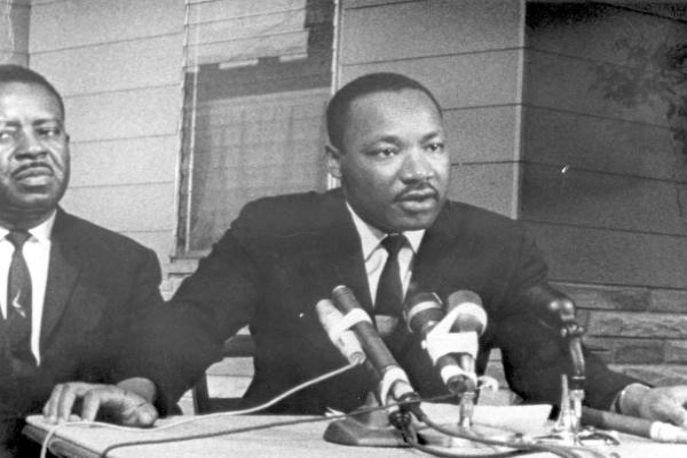Photo Credit: Florida Memory
Over the course of American history, few Americans have ever created as lasting or as significant of an impact as Rev. Dr. Martin Luther King Jr. He’s known as an excellent orator, the face of modern peaceful protest, and an iconic champion of civil rights for Black Americans. However, as time has passed, much of King’s radical rhetoric, messaging, and history has become watered down, sanitized, and even obscured. This is particularly true concerning King’s involvement with the labor rights movement. In honor of this Martin Luther King Jr. Day, a holiday his wife and fellow activist, Coretta Scott King, remarked as being the “first national holiday for somebody who gave his life in the labor struggle”, we’re reflecting on King’s legacy in the labor movement and what we can all learn from it.
As a prominent civil rights figure, he broke many remarkable barriers against Black Americans and other Americans of color. His leadership of the Montgomery Bus Boycott [sparked by Rosa Parks’ (and Claudette Colvin’s) protest and subsequent arrest] led to a Supreme Court ruling which made segregation on public busing unconstitutional. The Birmingham Campaign, co-led by King, Fred L. Shuttlesworth, and Ralph Abernathy, had protesters who suffered nationally televised police brutality so shocking that it directly led to not only federal government intervention to change local segregation law, but also prompted President John F. Kennedy into proposing legislation that evolved into the Civil Rights Act of 1964. These events, combined with many other accomplishments including leading a successful March on Washington, his founding of the influential Southern Christian Leadership Conference (SCLC), and his delivery of one of the most impactful speeches in modern history, “I Have A Dream”, led to him becoming an international icon. Yet, this was far from where he wanted his work to end. He knew that there is no racial equity without economic equity.
King’s shift towards uniting the civil rights and the labor rights movements, which many historians note, began alongside Black female protesters during the Scripto Strikes. Just before his assassination, King was partnering with Memphis Sanitation Worker strikers during his Poor People’s Campaign. He did so because he believed that the fight for labor rights such as fair minimum wage, unemployment insurance, and more available jobs all worked in tandem with the fight towards racial progress. In his book, Stride Toward Freedom: The Montgomery Story, King tells the reader about the united interest of economic justice for the working class, and warns of how racial divisions hinder that mission:
Both Negro and white workers are equally oppressed. For both, the living standards need to be raised to levels consistent with our national resources. Not logic but a hollow social distinction has separated the races. The economically depressed white accepts his poverty by telling himself that, if no other respect, at least socially he is above the Negro. For this empty pride in a racial myth he has paid the crushing price of insecurity, hunger, ignorance, and hopelessness for himself and his children.
Strong ties must be made between those whites and Negroes who have problems in common. White and Negro workers have mutual aspirations for a fairer share of the products of industries and farms. Both seek job security, old-age security, health and welfare protection. The organized labor movement, which has contributed so much to the economic security and well-being of millions, must concentrate its powerful forces on bringing economic emancipation to white and Negro by organizing them together in social equality. (King)
As time has passed, fights for and against racial progress have been happening in all spaces, especially workplaces. The 2020 surge in civil rights protests prompted many workplaces to address company inequities, particularly towards racial minorities. However, we have begun to see a rollback of some of these protections. With DEI positions facing disproportionate layoffs, workplaces not fulfilling pledges they’ve made to Black communities, and concerns of last year’s Affirmative Action Supreme Court Case impacting corporate diversity practices and initiatives, we are witnessing a very real regression from the progress that we’ve made.
Today, workplaces can strive toward creating environments and policies that reflect King’s dream for us all. As employers, it is our responsibility to make the commitment towards respect and equity in the workplace every day, not just when it’s a trending topic. Here are some examples of what this can look like at your organization:
-Fair pay and policy review: Examine your organization’s employee pay scale and identify places to create more parity.
–DEI training and programs: Provide organizational cultural trainings and programs to executives, managers, employees, and customers that help build a more respectful, equitable environment where all can thrive.
–Community engagement: Finding ways to give back to one’s local community and organizations, such as RALIANCE’s Impact grantees, who implement projects that support survivors and help prevent sexual violence, particularly for communities that are often heavily impacted by sexual violence yet historically overlooked by funders.
It’s important to take the time to honestly reflect on the legacy of King’s words, on both his holiday and every day. His mission can only be honored through telling his story in its entirety. Let’s all work towards using the best of his ideas as a guiding point for our mission of achieving widespread workplace equity.
RALIANCE is a trusted adviser for organizations committed to building cultures that are safe, equitable, and respectful. RALIANCE offers unparalleled expertise in serving survivors of sexual harassment, misconduct, and abuse which drives our mission to help organizations across sectors create inclusive environments for all. For more information, please visit www.RALIANCE.org.

